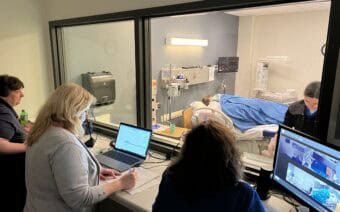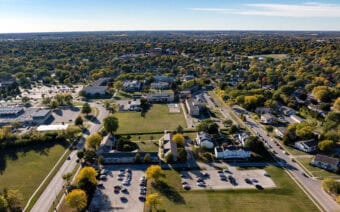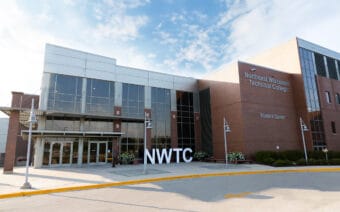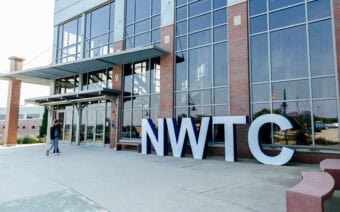
June 28, 2023
DE PERE – A former local high school is evolving in its purpose once again.
The Pennings Activity Center (PAC) on the St. Norbert College (SNC) campus – the former Abbot Pennings High School – will become the site of the Donald & Patricia Schneider Family Hall, thanks in part to a leading gift from the Schneider family.
While the college isn’t releasing the donation amount, the new hall will represent a $25 million to $30 million project in its totality.
“There are other donors participating in the project, but without the gift from the Schneider family, we would not be able to do it,” SNC Interim President Thomas Kunkel said. “We’re hoping to do a nice plaza tied to the river – something that will be a real draw for students and others in the community.”
The new building will become home to the Donald J. Schneider School of Business & Economics.
Work on the project is set to begin this winter and is expected to start welcoming students in fall 2025.
Kunkel said the Donald & Patricia Schneider Family Hall will be a “signature, showcase building,” situated on a high-profile location at the western end of the Claude Allouez Bridge – a point that thousands of vehicles and pedestrians pass each day.
Miron Construction is the general contractor for the project, with Workshop Architects of Milwaukee designing the building.
Building details
The 45,000-square-foot, multi-use facility will include classrooms and workspaces, space for executive education and conferencing opportunities and a connected terrace for gathering along the Fox River.
It will house the college’s undergraduate and graduate business and economics programs, including data analytics and a new sports management program that launches in the fall.
Supporting strong program
Dan Heiser, dean of the Schneider School of Business & Economics and professor of business administration, said the business school serves almost 33% of undergraduate students at the college.

Dan Heiser
“That percentage has grown over time and should continue to grow with the new building and new programs coming online,” he said.
Undergraduate programs under the Schneider School of Business & Economics, include:
AccountingBusiness administrationData analytics, economicsInternational businessLanguage area studies and leadership studies.
Also under the business school umbrella are its Masters of Business Administration program, Center for Exceptional Leadership, Center for Business & Economic Analysis, Strategic Research Institute and Nonprofit Leadership Development program.
“Students are interested in college being a launchpad for their professional career, and for many, that involves business,” Kunkel said. “This is already one of our strongest programs, and as we go forward, the success of our business programming will be a dynamic engine for the college at large.”
Kunkel said the new building is important on “all sorts of levels.”
“The impact is going to be dramatic and broad,” he said. “The impact started with the announcement.”
Not only will the building be modern, but Kunkel said so is what will happen within it on behalf of students.
“This building is going to be modern in its pedagogical approach (to education),” he said. “There will be a big portion devoted to a gathering space, and that’s consistent with what’s happening in education in general. For our students who are business majors, it will be their adopted space. We know from experience, if the building works like we want it to, even when they’re not in class, they will hang out there.”
The building, Kunkel said, will also serve as a dedicated space for the overarching business community.

Thomas Kunkel
“We believe our business school is a hub of the business world and the business scene in Northeast Wisconsin,” he said. “I tell people to think of the building as an extension of the Titletown District. The same corporate entities you see in the Titletown District and business compound will be represented in this building.”
Kunkel said not only will that well serve the student population, but it will also allow the college to attract events, like conferences, business events and pitch events.
“(We’re creating) an environment where business leaders and mentors can interact with our students and vice versa,” he said. “Taken together, it’s a powerful opportunity for St. Norbert College as we continue to grow and improve our business (offerings).”
The building’s past iterations
SNC has owned the property at the corner of 3rd and Reid streets since the former high school closed in 1990 with the merger of Pennings, Premontre and St. Joseph’s Academy into Notre Dame Academy.
The building dates back to 1923 when it was built as West De Pere’s Nicolet High School.
In 1959, it was purchased by the Norbertines and renamed Abbot Pennings High School in honor of St. Norbert College’s founder, Abbot Bernard Pennings.
It features an abundance of classrooms, as well as a theater and a gymnasium.
Under the college’s ownership, the PAC has served many purposes over the years.
Currently, it houses the Campus Safety Office and supports a variety of departments.
“That building has (also) had some kind of classes in it since we acquired the building,” Kunkel said.
Over the past decade, Kunkel said the existing building has served as a “surge facility,” accommodating departmental overflow needs or accommodating entire departments when campus renovations were underway.
He said it has also housed student activities and even a student night club.
“It’s been everything you can imagine, and we have looked at it at least a half dozen times to figure out how to repurpose or rehabilitate it as we know there are people still emotionally connected to it,” Kunkel said. “But there are too many obstacles. It’s sad to see it go, but we are delighted the most visible corner of campus, where we interface with the community at large, will house a modern showcase building.”
Kunkel said the legacy of Nicolet/Pennings High will be memorialized in Schneider Family Hall, and the college will share plans for public recognition of the building this fall before it is razed.
Building and broadening impact
Heiser said the college is proud of all its business and economics programs, with accounting and interdisciplinary analytics programs being particularly impactful.
The accounting program, he said, has one of the highest pass rates nationwide on the certified public accountant (CPA) exam for a school the size of SNC.
Heiser said the new hall will help to support some of the newer additions to the Schneider School of Business & Economics born through feedback from students and others – which includes the introduction of a data analytics major in fall 2020 and the addition of a new sports management minor this fall.
The new data analytics program, Heiser said, is “truly phenomenal.”
“We graduated our first business analytics major this spring, but it builds on the foundation laid long ago by our Center for Business & Economic Analysis (CEBA),” he said.
Heiser said Marc Schaffer, the CEBA’s executive director, hires a cohort of undergraduate student fellows each year to participate in projects for various clientele, including local companies and nonprofit organizations, as well as corporations in Chicago and New York City.
One differentiator, Heiser said, is the students’ ability to access hands-on learning as undergraduates, work typically only provided to individuals post-doctorate elsewhere.
“Most comparable analytics centers are staffed by post-docs,” he said. “CEBA is a unique asset for the region and truly challenges our undergraduates to excel.”
Last year, Heiser said the CEBA brought on Kim Smith as associate director, a communications professor who works with students to draw out what they have learned as part of the college’s liberal arts core curriculum.
“We want them to confidently communicate in a way that effectively delivers knowledge from data and persuades their audience,” Heiser said. “Industry has told us they don’t just want ‘data geeks.’ They want ‘geeks who can speak.’ We designed our analytics program accordingly.”
Heiser said SNC’s Center for Strategic Data Analysis also has a high impact and serves as a great example of an academic program that is working in partnership with corporations in real time and convening twice a year on what’s happening in Green Bay and beyond.
The center works with 150 business executives and leaders who, he said, in turn, benefit from a great recruiting opportunity.
He also said the sports management minor was an outgrowth of the ongoing conversation between students, incoming students and the college.
“The concentration in sports management is an example of the college responding to demand on the part of students for more and different kinds of business education, but also a good example of us (responding) to a need to educate and activate,” Heiser said. “Many of them come in with an idea of what they want to do in their careers. We are having conversations about how we can respond to 21st-century interests and demands on the part of our students and their families.”
Heiser said the sports management minor is highly interdisciplinary, and he anticipates it will grow into a major at some point – and offer opportunities to intern with a professional sports organization, providing opportunities to both get a “foot in the door” and see “behind the curtain” to truly understand how the sports industry operates.
Up next, Heiser said, is enhancing the school’s entrepreneurship offerings.
“This new building is going to help us in this regard,” he said.
It will offer dedicated space for a new Entrepreneurship Center and offer other features that build capacity for what he describes as a world-class, interdisciplinary entrepreneurship curriculum.
Most notably, Heiser said, is the “pitch pit,” a space optimized for Shark Tank-like events.
“It will be used by a variety of programs, but it’s specifically designed to prepare students for competitive pitch competitions and selling their ideas for venture capitalists,” he said.
The building will also feature a podcasting studio.
Heiser said one of the college’s alumni, a serial entrepreneur, helped build a billion-dollar business in podcasting.
“When she is back on campus inspiring our students to follow in her footsteps, we want to be ready to support their dreams,” he said. “The studio will also serve faculty as they expand our online and hybrid coursework in the future.”
Supporting existing employees
Heiser said the hall will also support individuals already in the workforce to pursue graduate education (including their Masters of Business Administration), as well as leadership training.
Companies from throughout the New North region, Heiser said, send their managers and leaders for leadership training at the Center for Exceptional Leadership (CEL).
Both the MBA program and the CEL are key resources for employers to enhance employee retention and satisfaction, he said.
“Wisconsin’s unemployment rate is less than 2.5%, and there is a huge war for talent raging just beyond our doors,” he said.
“When employers invest in professional development, they’re not only building their future leadership pipeline. When the employee knows their boss sees their potential for growth and advancement, they’re much more likely to reciprocate with loyalty to the organization. It’s truly a win-win for everyone.”
Sachim Shivaram, chief executive officer at Wisconsin Aluminum Foundry, chairman of the Schneider School of Business & Economics board of directors and lecturer on business ethics for the MBA program at SNC, said he is a huge proponent of the value of all the school’s offerings, with a special emphasis on the MBA program.

Sachim Shivaram
“Each year, we sponsor someone with a scholarship to pursue their MBA,” he said. “Aaron Kupsky, our purchasing manager, just completed his (MBA) at St. Norbert. We have someone who has great knowledge of supply chain and purchasing. With this program, he (has come to) understand the business more holistically. He’s going to be a leader in our company because he (built) those well-rounded skills.”
Shivaram said the new hall includes creature comforts for lecturers and students alike.
“As a teacher, we are (in a classroom) for three hours at a stretch, and we need a good facility with good technology,” he said. “This last semester, I had to move my class around a few different times because of events going on. Space is definitely needed, and students want to be in a comfortable setting. This will provide that.”
The CEL is seeing growth as well.
Since 2020, it has tripled both in the number of students it serves, as well as the programs offered.
In the process, Kathi Seifert – retired executive vice president at Kimberly-Clark Corporation, owner of Katapult, LLC and member of the New North, Inc. board of directors – said it has significantly broadened the scope of its offerings for the business community beyond campus.
“I was part of the group that helped to start CEL years ago when there was clearly a need in our community to build stronger leaders for the business community,” she said. “The beautiful thing is that business leaders in our community who have sent their people to CEL have been so impressed with the leadership development that they have sent more and more people to go through the program.”
Seifert said it has also prompted the creation of different leadership programs for different levels of leaders, as well as the development of Nonprofit Leadership Development.

Kathi Seifert
“It’s exceeded all expectations, and this new hall will provide a better space to share curriculum with the leaders coming through the programs,” she said. “The demand is clearly there.”
Seifert said the CEL’s cohort-based leadership program has resulted in continued networking, mentoring and other interaction among each cohort’s members long after they leave the classroom.
“Many of the cohorts want to stay together because they have learned so much from each other and can support and mentor each other,” she said. “It makes our region even stronger in supporting businesses and business growth in our region. This building will be a beacon that highlights that we seriously support businesses in all sorts of ways.”
Echoing the point, Kunkel said the hall is a great “opportunity for the campus to continue to participate in the renaissance of De Pere.”
“We’re excited about it and continue to look at things we might want to do with the northern tier of our campus,” he said. “What’s happening with the business school is just the beginning of what is happening for the college on that end of campus.”
 Welcome to Camp Elsewhere – a woodsy retreat
Welcome to Camp Elsewhere – a woodsy retreat ‘Some really tall ships’ are returning to Door County
‘Some really tall ships’ are returning to Door County







